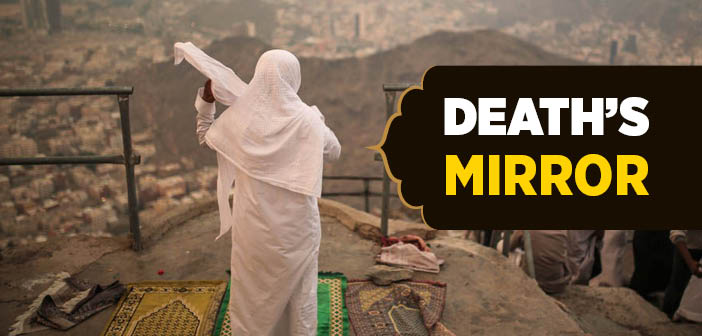What is the regret in islam? What does regret means in islam?
The Messenger of Allah (may Allah bless him and grant him peace) once said by way of warning to his community:
“There is no one who dies who does not feel regret.” His Companions asked:
“What shall they regret, O Messenger of Allah?” The Messenger of Allah (may Allah bless him and grant him peace) said:
“A good-doer will regret that they did not do more and a wrongdoer will regret that they did not give up evil and reform their ways.” (Tirmidhi, Zuhd, 59, 59/2403)
Allah Almighty cautions us as follows:
“You who believe! do not let your wealth or children divert you from the remembrance of Allah. Whoever does that is lost. Give from what We have provided for you before death comes to one of you and he says, ‘My Lord, if only you would give me a little more time so that I can give sadaqa (charity) and be one of the righteous!’ Allah will not give anyone more time, once their time has come. Allah is aware of what you do.” (Al-Munafiqun, 63:9-10-11)
“He will say, ‘Oh! If only I had prepared in advance for this life of mine!” (Al-Fajr, 89:24)
A person of means, therefore, should send in advance to the Next Life the Divinely-bestowed provision that they received while they still have the chance, preparing for the difficult and gruelling Day of Reckoning. It should not be forgotten that when we all pass on to the eternal world in the future, neither will the wealthy have any means at their disposal to give away, nor will any possibility remain of turning fleeting bounties into capital for eternal happiness.
‘Ali, (may Allah be well pleased with him) said:
“This world is retreating and the next is approaching. Both have sons of their own. Be among the sons of the Next Life and not among the sons of this world.
Today there is a chance to act and without reckoning. While tomorrow there will be only reckoning and no chance to act.” (Bukhari, Riqaq, 4)
Just as a student leaving an exam room cannot return to the exam, respond to examination questions and in this way increase their mark – even if they remember the answers that escaped their mind during the exam – remembering that, after death the answers to the questions in the trial of life will not avail a person in the least; far from it, they will be more a cause of regret.
The wise words of Abu Dharr (may Allah be well pleased with him) powerfully encapsulate the importance of preparing for Next World, so as then not to say, “If only…”
“There are three partners in one’s wealth. The first is you, the owner. The second is Divine destiny, which does not consult you as to whether it will bring destruction or death. The third is its heir, waiting for you to put your head down (in the grave), and take away your wealth upon your death, while you are left to account for it. Do whatever you can to ensure that you do not become the most helpless of these three partners.
Allah, gloried and exalted be He, says: ‘You will never be able to attain godliness and virtue until you spend of what you love (in Allah’s cause, or to provide sustenance for the needy)…’[1] This camel is the most prized of my possessions, so I am sending it ahead of myself.” (Abu Nu’aym, Hilya, I, 163)
The following practice of the gnostic Ar-Rabi’ ibn Khaytham is should be noted in the matter of preparation for death and beyond:
Ar-Rabi’ ibn Khaytham once dug a grave for himself in his garden. When he felt that his heart becoming hardened, he would lie down in it and remain there for some time. He would contemplate his inevitable departure from the world. Reflecting upon the need he will have in the grave for repentance and charity, he would think about the reckoning in the Next Life and engage in deep self-criticism. He would then recite the following verses from the Qur’an:
“When death comes to one of them, he says, ‘My Lord, send me back again so that I may act rightly regarding the things I failed to do!’ No indeed! They are merely words that he utters. Before them there is an interspace until the Day they are raised up.” (Al-Muminun, 23:99-100)
When Ar-Rabi’ got out of the grave, he would say to himself:
“O Rabi’! Look, today you have been sent back. But there will come a time when your request will not be fulfilled and when you will not be sent back. So, take utmost precaution and increase your efforts of righteousness, your struggle in the way of Allah and your preparations for the Next Life.”
Imam Ghazali’s (may Allah have mercy on him) words of caution are also piercing:
“O youth, suppose you die today. How you will be grieved for all your moments of heedlessness, exclaiming, ‘If only!’ But Alas! (There is no chance of return!)”
“Every believer should remind themselves after observing the Morning Prayer:
My capital is my life. When my life comes to an end, my capital is all that I spent that I no longer have any chance of acquiring. Today is a new day. Allah the Exalted has favoured me by granting me respite. (Turning over a new leaf for me in the book of life.) Had he seized my soul, I would surely have wished to be sent to the world, even if for one day, to perform many deeds of righteousness.
Now suppose you have died and have been given permission to return to the world for one day. So, keep away from evil today, whatever you do! Waste not even a single moment today. For every breath is a priceless blessing.”
For this reason, hastening to do good for the Next Life should be everyone’s priority. This is why we must not be deceived by the world’s temporary pleasures. We must not forget that all the worldly bounties we imagine that we own are in actual fact no different to a treasure found in a dream. In the words of Mawlana Jalal al-Rumi, we must strive to “return to the true owner everything that needs to be returned before death takes back what was given.”
Allah Almighty cautions us against heedlessness in this regard:
“You who believe! Give away some of what We have provided for you before a Day arrives on which there is no trading, no close friendship and no intersession. It is the unbelievers who are the wrong doers.” (Al-Baqara, 2:254)
Let us thus, in line with the maxim, “Die before you die,” abandon today, with our own free will, those baseless passions and worldly desires which we will be forced to abandon at death. Let us reform ourselves with repentance before death strikes, so that the last breath will not be a mirror of disappointment in which we behold our lives in regret.
It will not be possible for us to do anything for our Next Life, once the span of our lives comes to an end and any remorse for our worldly lives will be utterly useless. Time is the greatest favour that Allah bestows upon His servant. Time cannot be turned back, accumulated, lent or borrowed. In fact, Allah swears by time in the Qur’anic chapter ‘al-‘Asr,’ warning that those who do not believe and do not perform good deeds of and therefore fail to call to the truth and patience are in a state of total loss.
Consequently, today is the day for preparation for a reckoning that will enable us to attain forgiveness and acceptance on the Day of Gathering. The time to act is now! For this reason, it has been said, “Those who defer to tomorrow have been ruined!” For nobody has any guarantee that they will make it to tomorrow.
We should hasten, therefore, to do great works and make the following counsel of the Messenger of Allah (may Allah bless him and grant him peace) our life’s motto:
“O People! Repent to Allah before you die. Hasten to do good deeds before you become preoccupied with other troubles and hardships. Uphold the rights of your Lord by remembering Him a great deal and by giving a great deal of charity, openly and secretly, that you be granted provision and Divine support, and your condition be reformed.” (Ibn Majah, Iqama, 78)
[1] (Al-i Imran, 3:92)
Source: Osman Nuri Topbaş , Journey To Eternity, Erkam Publications





